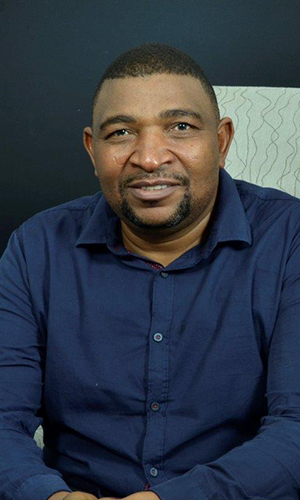News & Events
Journeys of postdoctoral excellence celebrated
Professor Edith Phaswana, Acting Head of Academic Programmes at the Thabo Mbeki African School of Public and International Affairs (TM-School), recently interviewed two of the school’s postdoctoral fellows whose terms are coming to an end.
The achievement of these outstanding fellows motivated her to have this conversation to inspire other postdoctoral fellows at Unisa. Both Drs Precious Nwachukwu and Toendephi Shonhe joined the Thabo Mbeki African Leadership Institute (TMALI), one of the former institutes that came together to establish the TM-School, in 2018. Phaswana says, “It is really encouraging to witness these outstanding achievements. At the then TMALI, postdoctoral fellows were exposed to the rich archive of African intellectual tradition to look at the contemporary world and provide solutions for the future. This helps them to produce groundbreaking work that the world of knowledge is thirsty for. This is aligned with the university’s transformation imperative of Africanisation and decolonization of knowledge.”
Below they share their journeys with the Unisa community. Another postdoctoral fellow, Dr Isaac Shai, has recently been appointed as Associate Professor at the College of Law at Unisa after spending almost three years at TMALI. The new TM-School seeks to continue this legacy of excellence in research and innovation at Unisa.
Dr Precious Nwachukwu

Why did you join TMALI (now TM-School)?
I joined TMALI on 1 April 2018. I decided to join TMALI as inspired by the former President of South Africa, Thabo Mbeki, who elicits ethical leadership, and a deep commitment to the socio-economic development of Africa and the promotion of Afro-centric ideas to improve the lives of millions of Africans with some germane philosophical ideas. Furthermore, the crop of scholars within TMALI influenced my decision to join the Institute and to improve my skills and development, as a rich academic culture inspires hard work, and having interactions with knowledgeable scholars is quite enriching.
What has been your main research foci?
My areas of research focus include psycho-social developmental sociology (focusing on gender and entrepreneurship) and administration in socio-environmental ethics and sustainable livelihoods (focusing on social justice advocacy and humanitarian ethics) within the African context. The contemporary concepts on the African-centred perspectives in the key areas of sustainability and policy advocacy through sound, ethically patterned workable African developmental strides and human cohesiveness are areas of trans- and inter-disciplinary research nodes.
What has been your greatest postdoctoral studies achievement in the past three years?
During my postdoctoral studies, I have produced 12 articles consisting of 10 journals and 2 book chapters that were all accredited. This was way more than the required stated outputs of my contract, and I am currently on the verge of producing a book on Africanisation of socio-environmental ethics development and sustainability.
My three-year stay at TMALI has been very eventful, with progressive academic outputs. I have contributed to planning and hosting workshops and seminars within Unisa. In 2019, I was instrumental in influencing decisions to have the Distinguished Scholar, Prof J. Mfutso-Bengo (PhD, Regensburg) and MA (Innsbruck), a renowned bio-ethics expert, visit TMALI. I serve on the board of professional bodies such as the Research Ethics Association of Southern Africa. I have acted as an internal examiner, reviewed articles and performed editorial work during my stay. I have also promoted community engagement in line with Unisa’s Community Engagement Policy with the Sunnyside Counselling and Career Development Unit and with Tirisano Collaborative and Community Engagement Projects.
What has been your model of success?
The model of success I can share with other postdocs is that hard work, perseverance and dedication to the originality of your research areas should be paramount. Emerging scholars must be open and flexible to integrate and adapt to trans- and inter-disciplinary research engagement to fulfil academic success without losing their originality. There is a need for collaboration with other related disciplines that can augment research fields and widen horizons for excellence. Scholars should avoid being cramped in their discipline but widen out and be inventive.
What are your future plans?
My future endeavours are placed on the continuation of my commitment in recognising, cultivating and promoting the interests and interpretations of the Africanisation of socio-environmental ethics development and sustainability nodes within the lived experiences for students and disadvantaged population at large, especially on prior learning in order to achieve academic access in any institution I found myself. The post-COVID-19 academic system should include a blended learning strategy in the utilisation of multiple teaching and learning strategies and technologies that cater for physical and virtual resources that have their own encumbrances, especially for persons living with disabilities that might not be cared for in the sustainable livelihood plans. These populations have the potential to be instrumental in contributing to the productive sectors of the economy, but unfortunately, they are left behind in the psycho-social resource administration and livelihood sustainability schemes.

Dr Toendephi Shonhe
Why did you join TMALI (now TM-School)?
I was attracted to TMALI due the ideological thrust of the Institute. TMALI’s principal objective is to train Africans for their political, economic, social and cultural emancipation, which tallies with my own orientation and study interests. Africa requires change agents whose approach to knowledge creation and use is modelled by Afrocentricity and African-centred epistemologies and methodologies as a credible pathway towards Africa’s renewal.
What has been your main research focus?
My PhD thesis on land reform, accumulation and class formation delves into these issues, among others. Doing my postdoctoral studies at TMALI is therefore a significant opportunity to deepen and widen my studies and understanding of these material issues. Africa’s colonisation was marked by land dispossession and alienation, while the disposed population were proletarianised to work in white colonialists’ farms and industry for next to nothing in rewards. The only reason they were paid was for them to use the wage to pay tax and unwarranted fees of various sorts. The implication of all this on the accumulation trajectories for Africans within the context of Africa’s underdevelopment is dire. World system theory and its centre-periphery contractions continue to haunt efforts towards economic development in Africa and other countries in the Global South. Being at TMALI was a sure of securing an opportunity to learn and collaborate with the great scholars at TMALI. To be sure, TMALI is not just an institution of higher learning. It is a family of scholars sharing the same objectives, in multi-, inter- and trans-disciplinary approaches. I have also led the following field-based country research projects: 1) the political economy of agricultural mechanisation in Zimbabwe 2017 to present; 2) medium-scale farmers in Zimbabwe from 2018 to present; 3) agricultural commercialisation in Zimbabwe; 4) climate change and 5) the political economy of value chains under COVID in Zimbabwe.
What has been your greatest postdoctoral studies achievement in the past three years?
The collaboration with other scholars at TMALI and elsewhere, as well as through mentorship by senior academics. I have been able to lead five research studies in sustainability, agrarian studies and agricultural development. I have also published several papers, including four accredited journal articles, three book chapters, four working papers and a conference paper. Two books are on the verge of being published, one is already with publishers and under review. TMALI takes the issue of academic citizenship seriously. While teaching was not part of my contract, as an aspiring academic I volunteered to support students in some of the short learning programmes offered at the school.
What has been your model of success?
For me, success is the scope to learn, and the opportunity to develop into a full academic, based on TMALI experiences and opportunities. This was based on the ability to set a high target in terms of the number of publications and research projects one wants to work on. In this way if you don’t make it to your high target, at least you are bound to meet your contractual obligations with Unisa.
What are your future plans?
To continue learning and contributing and creating new knowledge as well as helping to develop change agents capable of contributing meaningfully to the renewal of Africa. I also aim to share this knowledge through academic writings and lecturing. I aim to produce empirically based research outputs that take advantage of the principle of co-creation with communities through participatory research. This is a priority in my scholarship.
* By the TM-School Communication Team
Publish date: 2021-03-24 00:00:00.0

